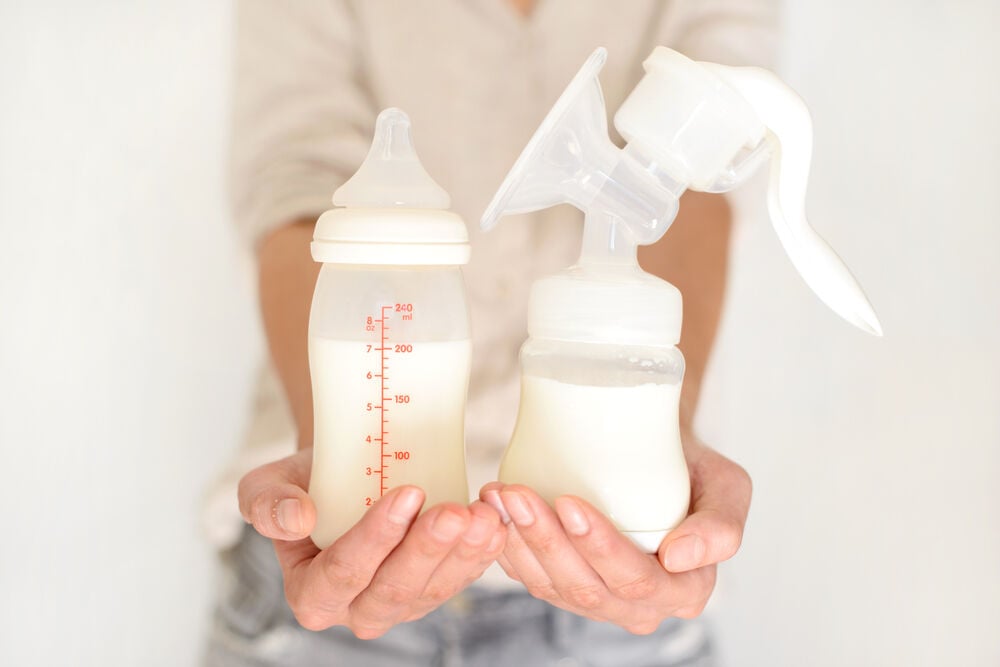Have you ever heard about donated breast milk? It might sound weird, but breast milk banks and donors are becoming more popular around the world. Thanks to these banks, more babies can enjoy the benefits of breast milk. But are they really safe? Let’s find out.
-
Tracking cycle
-
Getting pregnant
-
Pregnancy
-
Help Center
-
Flo for Partners
-
Anonymous Mode
-
Flo app reviews
-
Flo Premium New
-
Secret Chats New
-
Symptom Checker New
-
Your cycle
-
Health 360°
-
Getting pregnant
-
Pregnancy
-
Being a mom
-
LGBTQ+
-
Quizzes
-
Ovulation calculator
-
hCG calculator
-
Pregnancy test calculator
-
Menstrual cycle calculator
-
Period calculator
-
Implantation calculator
-
Pregnancy weeks to months calculator
-
Pregnancy due date calculator
-
IVF and FET due date calculator
-
Due date calculator by ultrasound
-
Medical Affairs
-
Science & Research
-
Pass It On Project New
-
Privacy Portal
-
Press Center
-
Flo Accuracy
-
Careers
-
Contact Us
Breast Milk Banks or Benefits of Donor Milk


Every piece of content at Flo Health adheres to the highest editorial standards for language, style, and medical accuracy. To learn what we do to deliver the best health and lifestyle insights to you, check out our content review principles.
What are milk banks?
We have known about the benefits of breastfeeding for a long time. Breast milk has all the nutrients your baby needs. It can boost their immune system, protect them from disease, and help them grow up strong and healthy. It is widely accepted that breastfeeding is the best way to feed any baby.
However, exclusively breastfeeding can be very difficult to achieve in some cases. Breast milk banks simply store this precious liquid to help feed babies whose mothers can’t breastfeed for whatever reason. Then, the milk is used to bottle feed babies who need it most. Certain banks, such as the Mothers’ Milk Bank, also provide relief for women who wish to donate their breast milk after losing a baby.
Who may need donor breast milk
In most cases, babies who are given donor breast milk are hospitalized. This includes premature babies, sick babies, or newborns with low birth weights. These babies are at a higher risk of developing life-threatening infections and can benefit greatly from taking breast milk exclusively. Babies who have access to breast milk have been shown to require shorter hospital stays after birth.
Newborns with low birth weight and premature babies are at higher risk of developing necrotizing enterocolitis (NEC), an inflammatory condition that affects babies’ digestive system and can lead to severe complications and death. There are studies that claim that feeding breast milk to premature and low-birth-weight babies can decrease the risk of developing NEC by 6–10 times. That is why the American Academy of Pediatrics recommends breast milk rather than formula for premature babies.
Babies who have access to breast milk have been shown to require shorter hospital stays after birth.
In other cases, it might be the babies’ mothers who are sick and unable to nurse. Women who have complications during delivery sometimes need to be hospitalized or die as a result of their complications. Their babies, who might be suffering from complications of their own, can’t get the benefits of breast milk from their mother.
Even when mothers are healthy, the stress of having a baby in the neonatal intensive care unit can negatively affect their breast milk supply. These babies can benefit from combining breastfeeding with bottles of donated milk. Having access to donated breast milk can provide great relief for families who are already worried about their sick infant.
Other reasons why a baby might be prescribed donated breast milk include:
- Failure to thrive
- Food allergies
- Formula intolerance
- Malabsorption syndromes
- Immune problems
- Nutritional support before and after surgical procedures
- Preterm birth and low birth weight
- Different infectious diseases
Take a quiz
Find out what you can do with our Health Assistant
Is it safe to use donor breast milk?
Yes. Milk that gets donated to any breast milk bank must go through a strict screening process before being used. Milk donors must report any relevant past medical history, and they also get blood work done. These blood tests rule out infectious conditions like HIV, different types of hepatitis, and syphilis. The screening process for milk donors is similar to the process that is carried out at blood banks.
Milk that gets donated to any breast milk bank must go through a strict screening process before being used. Milk donors must report any relevant past medical history, and they also get blood work done.
The donated breast milk is screened for bacteria and viruses, pasteurized, and then frozen until it needs to be used. Milk is even analyzed for fat, protein, and lactose content to ensure that each baby gets exactly the milk they need to cover their nutritional requirements.
How to buy breast milk
In most cases, you’ll need a prescription from your baby’s pediatrician in order to obtain breast milk from a breast milk bank. Since demand for breast milk is higher than the amount of milk available, most banks will prioritize each case based on the baby’s needs.
Contact certified milk banks that follow strict regulations. This will ensure that your baby is getting safe donated breast milk. Each milk bank will probably have their own procedure, which might include filling out applications so that the milk bank will be able to contact you.
Since demand for breast milk is higher than the amount of milk available, most banks will prioritize each case based on the baby’s needs.
Many breast milk banks are non-profit organizations, but in most cases, you’ll still have to pay some fees to cover the costs of transportation and screening. Some insurance plans might cover these fees.
Avoid ordering breast milk online or buying it from anyone other than a certified milk bank. Samples of breast milk purchased online have been found to contain strains of bacteria that could potentially harm your baby. Some samples of breast milk for sale were also found to contain substances like cow’s milk.
How to donate or sell breast milk

If you wish to donate breast milk, you simply have to contact a certified breast milk bank and follow their instructions. They will guide you through their screening process, and if approved, they will teach you how to properly store the milk until you hand it over to them.
If you wish to donate breast milk, you simply have to approach a certified breast milk bank and follow their instructions.
Although some breast milk banks have started to pay women for their breast milk, most experts disagree with this practice. They claim that by monetizing breast milk, banks are encouraging women to sell their breast milk rather than use it to feed their babies. Therefore, donating breast milk is the recommended practice.
Requirements to be a milk donor
Breast milk donors must be healthy, and they’re screened for several infectious diseases (HIV, HTLV, syphilis, and hepatitis B and C) and recreational drugs. They can’t be on any medications or drink alcohol excessively. Having received a recent transplant or blood transfusion can also rule out potential donors.
Donor breast milk vs. formula
Although infant formula contains the nutrients that babies need to grow, it can’t fully replicate breast milk. Research has shown that premature or sick babies have a lower risk of complications such as NEC when they are fed on breast milk. So while formula can work for babies who aren’t sick or have special requirements, breast milk is much better for babies who are at risk of developing health complications.
Breast milk is considered to be the best way to feed a baby, and it can be especially beneficial for babies who are premature or sick. In many cases, their mothers can’t produce the amount of milk that they need to regain their health and thrive. In these situations, breast milk banks can provide a wonderful way for women to selflessly help newborn babies and their families.


Hey, I'm Anique
I started using Flo app to track my period and ovulation because we wanted to have a baby.


The Flo app helped me learn about my body and spot ovulation signs during our conception journey.


I vividly
remember the day
that we switched
Flo into
Pregnancy Mode — it was
such a special
moment.
Real stories, real results
Learn how the Flo app became an amazing cheerleader for us on our conception journey.




